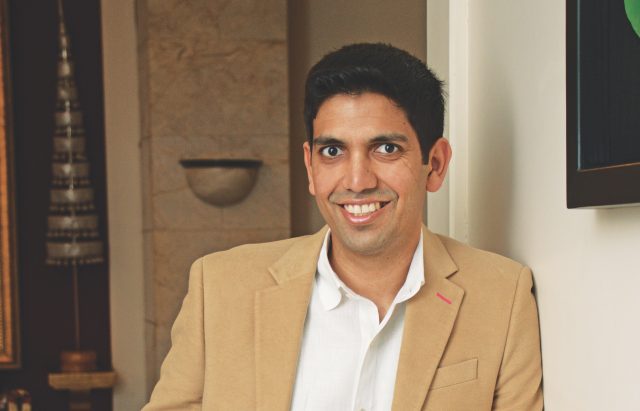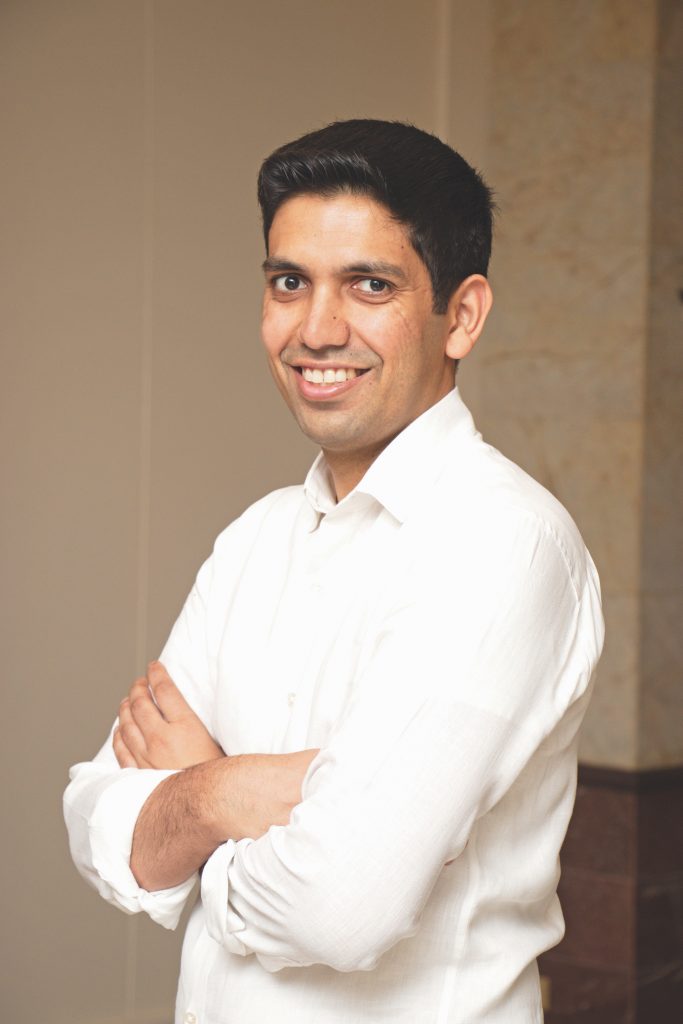Rahil Jogani, Partner at McKinsey & Company, gets down to business.
BY AIDEN JEWELLE GONZALES
When you see Rahil Deepak Jogani interact with his adorable one-year-old son and wife, his easygoing manner and relaxed mien belie the fact that the 34-year-old family man is also a Partner at one of the most prestigious management consulting firms in the world, McKinsey & Company. Humble at his core, Rahil brushes off his array of accomplishments despite his youth, and credits his upbringing in both Thailand and India with the values and drive he’s needed to succeed. “Growing up around cultural diversity in both countries has been incredibly important for me,” he reveals. “I work with global institutions and I regularly connect with people from all over the world, so while their end goals may be the same, the way of business can vary. The diversity from my upbringing has allowed me to more seamlessly fi t into global situations.”
Born in India but raised in Bangkok after he turned five, Rahil was, like many expatriate children, exposed to a melting pot of cultures in an international school. He cultivated open mindedness and respect for what he could learn from other cultures and traditions, made clear by the way he talks about his roots. “I learned humility in Thailand,” he says, “and it has helped in interacting with clients when I recommend business decisions to them – their companies have decades worth of history, culture, and their own style of working. It’s important to respect and incorporate these in how they transform themselves, or else the change will never stick.”
After graduating from Ruamrudee International School (RIS), Rahil pursued an undergraduate and master’s degree in electrical and bioengineering at the University of Illinois at Urbana-Champaign (UIUC) and Stanford University, respectively. A passionate learner and a problem-solver at heart, Rahil dove into a wealth of pursuits within and outside his academic studies. He initially sought to improve the lives of patients through his academic and research focus, which was on ways to improve medical imaging so that doctors can better diagnose patients. During his undergraduate and graduate years, he spent time at places like Siemens, Boston Scientific and the Stanford Cancer Center to develop better imaging equipment. At the same time, he explored other disciplines, ranging from investment banking to consulting to understand what he wanted to pursue after he graduated.
Through these experiences, Rahil developed a taste for applying his knowledge to find innovative solutions to problems. “These opportunities helped me understand what I was truly interested in as well as provided me with a set of foundational experiences,” he explains when sketching out his journey towards management consulting. Over time, he came to the realisation that engineering, while an attractive pursuit to him, afforded him only a very specific and narrow concentration. He preferred to instead take up a career that would allow him, in his own words, to “maintain a broader lens on the problems I would be able to solve and influence.”
When asked what attracted him to McKinsey & Company, Rahil once again refers to his love of learning: “early on in my career, the learning opportunities were most intriguing. The nature of the work allowed for the development of a broad range of skills, which over time led to a breadth of opportunities and problems which I work on.” Certainly, these opportunities were manifold – from advising clients across North America, Europe, and Asia and the unique possibilities and challenges in each region; to developing cutting-edge perspectives on a variety of topics related to digital and technology-enabled transformations, and how that has enabled institutions to fundamentally change the way they work. “Working in a rapidly evolving fi eld with unprecedented change is incredibly attractive,” Rahil enthuses. “Moreover, the problems I’ve had a chance to work on are complex and getting them right allows the institutions to fundamentally transform themselves, and in turn, serve their customers better. The challenge that comes with bridging the analytical and the creative sides to address problems has been a big driving force.”
Rahil’s enthusiasm to tackle new challenges head-on has served him well, propelling him to Partner in 2018, at just 32 years of age. True to form, Rahil brushes off my accolades and attributes his success to continuous learning: “it has been important to learn something new every single day, all in the spirit of enriching my overall toolkit,” he tells me, “whether it’s how to solve problems to the best way to work with individuals.” He also credits the problem-solving fundamentals he’s developed over the years. “The problem-solving toolkit I learnt in university has been critical,” he advises. “This ranges from the ability to understand the root of the problem, to the ability to structure it in a way so something complex can be managed, analysed, and solved. There is rarely a black-or-white answer.”
Rahil talks about three philosophies behind the business decisions he recommends: “firstly, the change needs to be transformational and needs to matter to combination of employees, shareholders, and society; secondly, the change needs to be sustainable such that it can be maintained over a period of time; and finally, the change needs to support the success of individuals and leaders.” And the results are evident. “I’ve been fortunate enough to work in situations where I have been able to build long term people relationships, helped shape the direction of storied institutions, and supported multi-billion market capitalisation value,” Rahil relates.
However, the path to his current success hasn’t always been intuitive. “I grew up in an environment where most people I knew were entrepreneurs and small business owners, and I knew very few people who worked for large corporations,” he says to me. “As I started my career, the expectations and lifestyle were very different; however the principles of learning and humility were the same.” After over a decade of working, he is now more comfortable regularly sharing experiences with others making a similar shift. He also shared his principles of leadership, which are independent of one’s career pursuit. “Understand each person on your team individually, particularly what drives them. Focus on supporting the individual’s passion and growth, while also delivering on the commitments of the team. Also, keep a light environment,” he says with a smile, “we work too hard to not have fun!”
On that note, I ask him how he maintains such a good work-life balance despite such a high-powered career, and he replies, “I try to make the most of my time with my son and wife, despite travelling a fair amount. I also take several weeks off each year and spend time in Thailand and India with family. Moreover, I cultivate other interests. I follow politics across Asia, Europe, and North America, and I used to play and follow several sports, and still do when I have time.”
Despite his passion for his career, however, Rahil doesn’t see his future set in stone. “I try to evaluate what I do every year and decide how best to move forward,” he tells me. “Either way, I am seeking to get better at my work-life balance and trying to get even more healthier – this, like learning, is my never-ending journey.”







